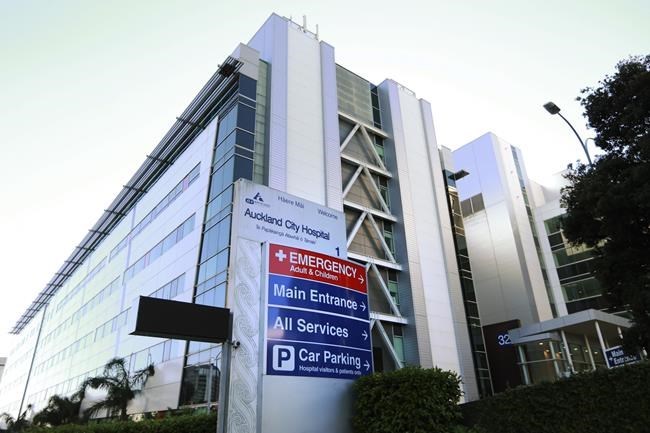
Signs are posted on the Exterior of Auckland City Hospital, May 13, 2017. New Zealand, Thursday, June 22, 2023, has been debating a thorny healthcare issue — whether ethnicity should be considered in deciding when patients get surgery. (Doug Sherring/New Zealand Herald via AP)
June 21, 2023 - 9:25 PM
WELLINGTON, New Zealand (AP) — New Zealanders this week were debating a thorny health care issue — whether ethnicity should be a factor in determining when patients get surgery.
It turns out that in some parts of Auckland, the country's largest city at 1.4 million people, clinicians have been using an algorithm to adjust where patients sit on elective surgery waitlists. Clinical need remains the top factor, but the algorithm also takes into account how long patients have been on the waitlist, where they live, their financial circumstances, and their ethnicity.
Indigenous Maori and Pacific Island patients are given a higher priority on the list, pushing down white New Zealanders and other ethnicities. The idea is to balance out longstanding inequities in the publicly funded health system.
“At the moment, there is clear evidence Maori, Pacific, rural and low-income communities have been discriminated against by the health system,” Prime Minister Chris Hipkins told reporters.
The algorithm has been used in Auckland since February and similar policies have been in place there since 2020. But most people weren't aware of the algorithm until Monday, when radio station Newstalk ZB reported on it, saying some surgeons were ethically opposed to using ethnicity as a factor.
In an election year, the issue has quickly become a hot political topic, with conservative opposition parties coming out strongly against it.
“It's pretty simple,” Opposition Leader Christopher Luxon told reporters Monday. “Race shouldn't play any part in determining surgical need.”
The libertarian ACT Party has started a petition against what it describes as “race-based waitlists.”
Following the backlash, Hipkins quickly put on ice plans to use the algorithm more broadly across New Zealand's health care system.
Hipkins said he asked Health Minister Ayesha Verrall to take a closer look at the tool to ensure "we're not replacing one form of discrimination with another."
Verrall said Thursday she had been disappointed in some aspects of this week's debate.
“I think it is important that we address the inequalities that we have in life expectancy and health services for Maori,” she said. “I think it's disappointing the tone that it's taken."
She said one example of existing bias in the health care system was that Maori with the same heart conditions as white people get prescribed fewer medications.
Professional health care organizations have expressed mixed reactions to the tool. Groups representing nurses have backed it, while a group representing surgeons said it’s too simplistic.
About 10% of New Zealand's 5 million people are among those currently covered by the algorithm. Patients affected include those attending two large hospitals: Auckland City Hospital and Greenlane Clinical Centre.
Jo Gibbs, who directs hospital system delivery at Health New Zealand, said those who are sickest or most in need of care are treated first. Beyond that, she said, the algorithm was helping reduce barriers and inequities in the health system.
“We will evaluate the tool to check it is achieving its purpose,” she wrote in a statement to The Associated Press. “It has not been rolled out nationally.”
___
Find more of AP’s Asia-Pacific coverage at https://apnews.com/hub/asia-pacific
News from © The Associated Press, 2023